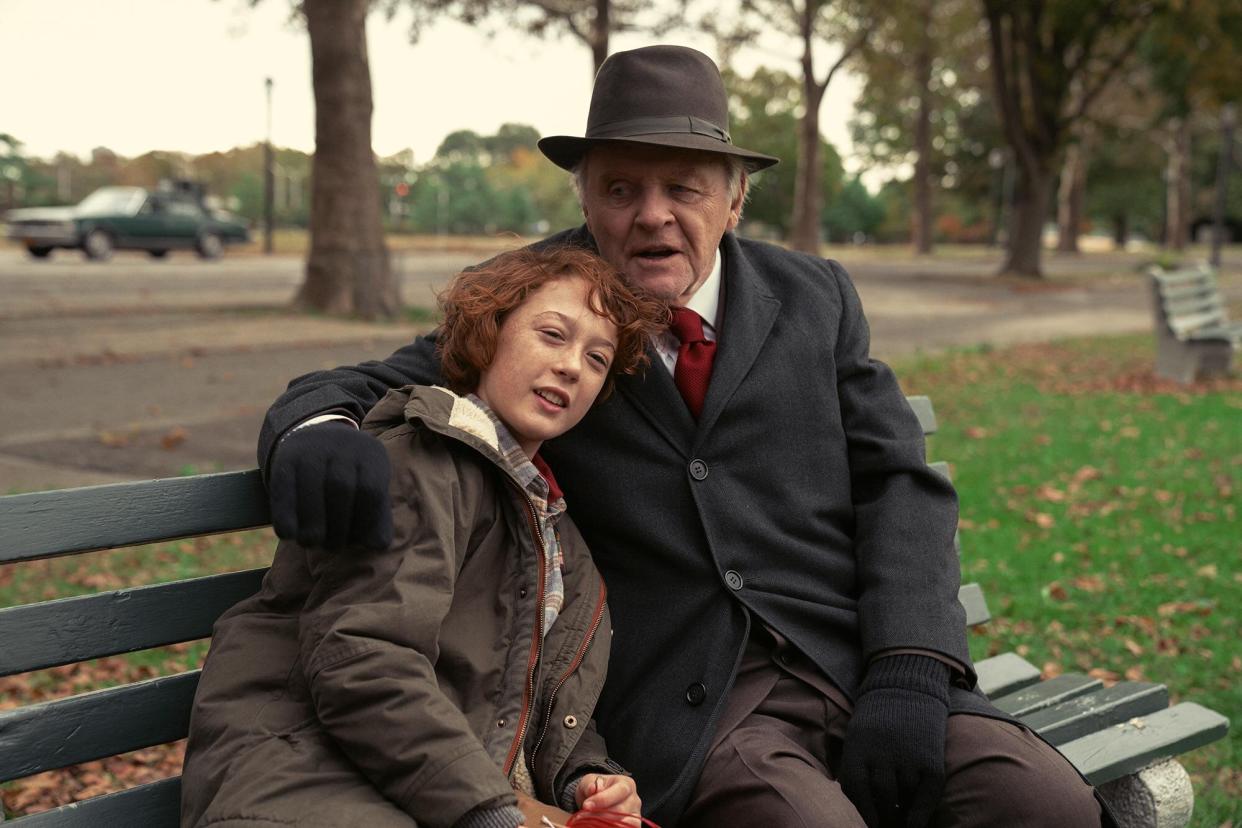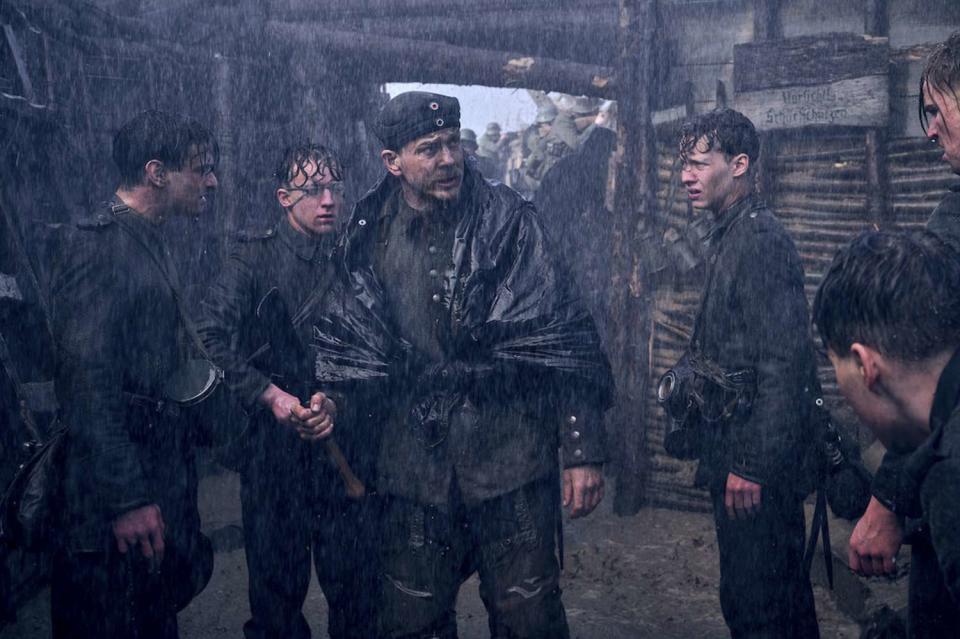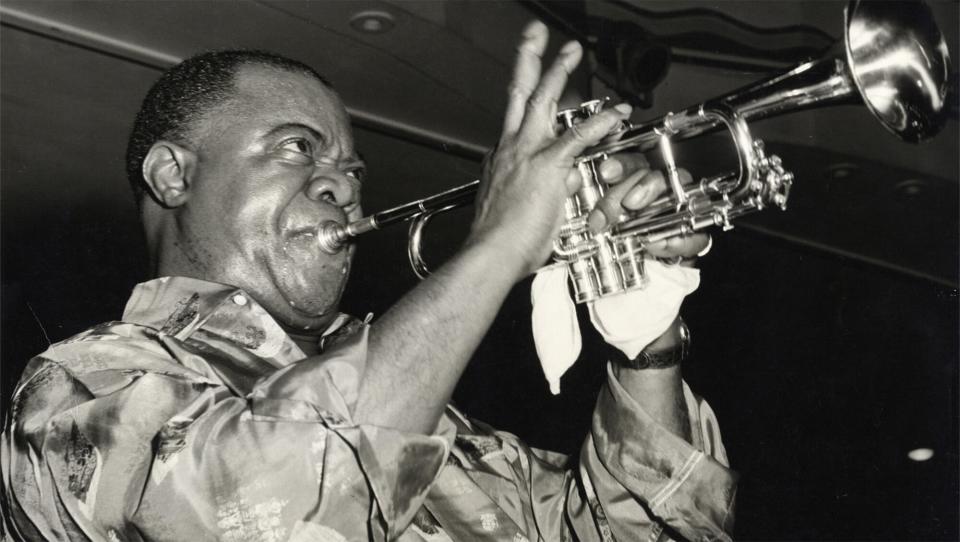Armageddon Time , All Quiet on the Western Front breathe life into the boyhood memoir and war film

- Oops!Something went wrong.Please try again later.
- Oops!Something went wrong.Please try again later.
- Oops!Something went wrong.Please try again later.
- Oops!Something went wrong.Please try again later.
- Oops!Something went wrong.Please try again later.
Armageddon Time
In theaters now

Anne Joyce / Focus Features Banks Repeta and Anthony Hopkins in 'Armageddon Time'
Writer-director James Gray has a home turf: blue-collar pockets of Queens and Brooklyn, often Jewish, where his family dramas, never strictly autobiographical, play adjacent to more epic genre instincts like crime and romance. But at the center of his churning, hard-nosed latest, Armageddon Time, Gray has a boy, who, if not exactly him, seems pretty close.
Paul (the wonderful Banks Repeta, balancing mouthy precociousness against hesitation) is a sixth-grader living in Flushing, Queens. Over the course of a few months in the momentous fall of 1980 when we get to know him, Paul dreams of being an artist, though, aside from a class trip to the Guggenheim Museum, that seems far off. He clowns and suffers in public school, neither an ace student nor popular. His bickering household is tense.
None of this is played for cute nostalgia's sake, or even laughs. Gray is after something rarer, a tone that, apart from his recent trips to the Amazon jungle (2016's The Lost City of Z) and deep space (2019's Ad Astra), he summons with career-long authority: the tough desperation of middle-class Jewish families intent on preserving their limited momentum in a still-threatening America. Paul's mother, Esther (a sharp Anne Hathaway), understands her son better than his stern, emotionally blocked engineer dad, Irving (Succession's Jeremy Strong, extraordinary in his quiet moments), a man more comfortable talking about truss bridges than feelings. There's also a doting grandfather played by Anthony Hopkins, but banish any Belfast twinkles from mind.
Armageddon Time loses a touch of its potency when straining for a larger, inchoate significance: Ronald Reagan on TV, nuclear anxieties, wisps of the Clash's strident reggae-rock (where the film's title comes from). But Gray makes up for it — impressively — by shading his characters in realistic, sometimes unflattering ways, stirring matters of race and privilege into the mix. There's even a Trump or two, filling the air with noise and signs of things to come. A nuanced exploration of situational ethics tinged with guilt, the film is a small, near-perfect New York story. And while its director may not say as much out loud, it's also an act of atonement. Grade: A– —Joshua Rothkopf
All Quiet on the Western Front
On Netflix now

Netflix
You may feel that you need another brutal battlefield movie like you need a hole in the head, and it would be a lie to say that there's anything remotely breezy about spending nearly two-and-a-half hours immersed in All Quiet on the Western Front. Much like 1917 or Saving Private Ryan, though, this sprawling German-language adaptation of Erich Maria Remarque's classic WWI novel is a film that feels both aesthetically dazzling and full of necessary truths: an antiwar drama that transcends the bombast of propaganda mostly just because it's so artfully and indelibly made.
Felix Kammerer is Paul Bäumer, a German teenage recruit thrilled to be going where the action is; within weeks they'll take Paris, a local grandee ensures him and his eager friends, and return to the Motherland as heroes. Instead, of course, it's a waking nightmare: a scorched bardo that toggles between abject tedium and annihilating violence for months and then years on end. But there's also a bone-deep camaraderie that blossoms in the trenches, not just between Paul and his fellow schoolmate recruits but with more hardened soldiers like Kat (Albrecht Schuch) — a rakish veteran with a knack for team-building and stealing geese (to these starving, freezing boys, one purloined bird is a feast).
There are also interspersed scenes of the Axis commanders controlling it all: well-fed, walrus-mustachioed men who gather around warm fires with their wine and cheese, whimsically deciding the fates of millions. Director Edward Berger (Patrick Melrose, Deutschland 83) isn't exactly subtle with those contrasts, but he draws lovely, painfully intimate performances from his tender young cast (along with more familiar faces like The Alienist star Daniel Brühl, as a rare back-office operator with a conscience); the spectral score by composer Volker Bertelmann is gorgeously unsettling, and the cinematography achieves a kind of painterly, panoramic grandeur. Western Front is hardly the first movie to show us on a grand scale that war is hell — in fact it's been more than 80 years since the original 1930 screen version took home two Oscars, including Best Picture — and certainly not the last. But it tells it profoundly and often heartbreakingly well. Grade: A– —Leah Greenblatt
Louis Armstrong's Black & Blues
In theaters and streaming on Apple TV+

Apple TV+
Is it a blessing or a curse to be forever associated with "What a Wonderful World"? By the time Louis Armstrong's Black & Blues gets around to that airy dream of a song, it's done the harder work of injecting some tougher stuff into a familiar story. Among this documentary's lesser-known revelations: Armstrong, famously personable, had a Nixonian side, taping hundreds of audio reels in his Queens home so that one day, he'd be able to set the record straight via his own testimony.
Those recordings are liberally sourced by filmmaker Sacha Jenkins, and would have made for a fascinating study on their own — a window into the privately aggrieved side of a cultural icon known for supplying a steady stream of joy. Jenkins, whose past work (including a killer 2021 profile of Rick James, Bitchin') usually demonstrates a well-judged sense of scope, here takes on a subject that feels too broad. Armstrong's innovations as a singer and soloist receive limited analysis, and while his genius may be self-evident, he deserves a deeper contextual exploration.
But so much of Black & Blues is glorious, not only its extraordinary archival footage (including Armstrong mixing it up on talk shows with sharp hosts like Dick Cavett and Orson Welles), but its passages from the jazzman's personal diaries, read by the rapper Nas with a fittingly complex sense of conscience and rage. A global celebrity during America's earliest conversations about civil rights, Armstrong preferred to keep his dissatisfactions to himself, becoming a symbol of change rather than a spokesperson of it. That tension comes to vivid life in Jenkins's worthy account, sure to be appreciated by those who come in on solid footing. Grade: B+ —Joshua Rothkopf
Related content:

